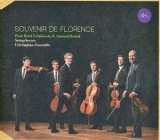 Piotr Tchaikovsky: Souvenir de Florence für Streichsextett; Antonin Dvorak: Streichsextett op. 48; Frielinghaus Ensemble (Gustav Frielinghaus Violine, Leonard Fu, Violine, Alejandro Regueira Caumel, Viola, Sao Soulez Larivière, Viola, Oliver Léonard, Violoncello, Mathis Merkle, Violoncello); 1 CD KKE 20002; Aufnahme 01/2020, Veröffentlichung 28/10/2020 /68'45) - Rezension von Remy Franck
Piotr Tchaikovsky: Souvenir de Florence für Streichsextett; Antonin Dvorak: Streichsextett op. 48; Frielinghaus Ensemble (Gustav Frielinghaus Violine, Leonard Fu, Violine, Alejandro Regueira Caumel, Viola, Sao Soulez Larivière, Viola, Oliver Léonard, Violoncello, Mathis Merkle, Violoncello); 1 CD KKE 20002; Aufnahme 01/2020, Veröffentlichung 28/10/2020 /68'45) - Rezension von Remy Franck
Der Geiger Gustav Frielinghaus, im Hauptberuf Primarius des Amaryllis Quartetts, hat für die zweite CD des Frielinghaus Ensembles Nachwuchsmusiker vereint und mit ihnen zwei beliebte Sextette aufgenommen. Sie interpretieren beide Werke dieses Programms mit hörbarer Spielfreude.
Der erste Satz von Tchaikovskys Souvenir de Florence erklingt mit tänzerischer Eleganz, nicht so fetzig und ungestüm, wie man ihn manchmal hört. Dadurch gewinnt der Satz an Charme, der sicherlich hier völlig angebracht ist.
Das Adagio hat man zwar verhaltener gehört, aber die intensive Lesart ist durchaus nicht unattraktiv. Das liebevoll und in den Stimmen sehr transparent gestaltete Allegro moderato lässt keine Wünsche offen. Das Allegro vivace liefert nicht nur ein gutes Beispiel ausgewogenen und präzisen Musizierens, sondern wird auch in tänzerischer Beschwingtheit dem Charakter des Werks gerecht.
Der gleiche Einsatz und die gleiche Musizierlust garantieren eine sehr stimmungsvolle Interpretation von Dvoraks Sextett. Auffallend sind sofort die Farbunterschiede zwischen Tchaikovsky und Dvorak, was zeigt, wie gut sich die Musiker auf einen Komponisten und dessen Musik einspielen können. Dadurch kommen das böhmische Element und der emotionale Gehalt in diesem Opus 48 nicht zu kurz, insbesondere im kontrastreichen ersten Satz.
Der zweite Satz, Dumka ist melancholisch und im zweiten Teil auch richtig schwermütig. Der Gegensatz zum nachfolgenden Furiant ist groß, aber das Frielinghaus Ensemble lässt es nicht zu kräftig werden, sondern betont den eleganten Charakter der Musik. Das ebenfalls kontrastreiche Finale entwickelt sich passend vom melancholischeren Beginn zur lichtvollen Coda.
Diese hochkarätigen Einspielungen beweisen also das sehr hohe Niveau dieses Ensembles, von dem man in Zukunft gerne noch mehr hören würde.
The violinist Gustav Frielinghaus, who is the principal violinist of the Amaryllis Quartet, has brought together young musicians for the Frielinghaus Ensemble’s second CD and recorded two popular sextets with them. They perform both works of this programme with audible enthusiasm.
The first movement of Tchaikovsky’s Souvenir de Florence has a swinging elegance and is less impetuous as in other interpretations. This adds an appropriate charm to the movement.
We certainly have heard more moving performances of the Adagio, but this sextet’s intense reading is by no means unattractive. The Allegro moderato, lovely and very transparent, leaves nothing to be desired. The Allegro vivace not only provides a good example of balanced and precise music-making, but also does justice to the character of the work in its dancing exuberance.
The same dedication, the same joy of making music guarantees a very atmospheric interpretation of Dvorak’s sextet. The differences in colour between Tchaikovsky and Dvorak are immediately noticeable, which shows how well the musicians can relate to a composer and his music. Thus the bohemian element and the emotional content in this Opus 48 are not neglected, especially in the first movement, which is rich in contrast.
The second movement, Dumka, is melancholic and in the second part quite despairing. The contrast to the following Furiant is great, but the Frielinghaus Ensemble does not let it become too strong. It emphasizes the elegant character of the music. The finale, also rich in contrast, develops appropriately from the more melancholic beginning to the luminous coda.
These top-class recordings thus prove the very high level of this ensemble, which one would like to hear more often in the future.
























